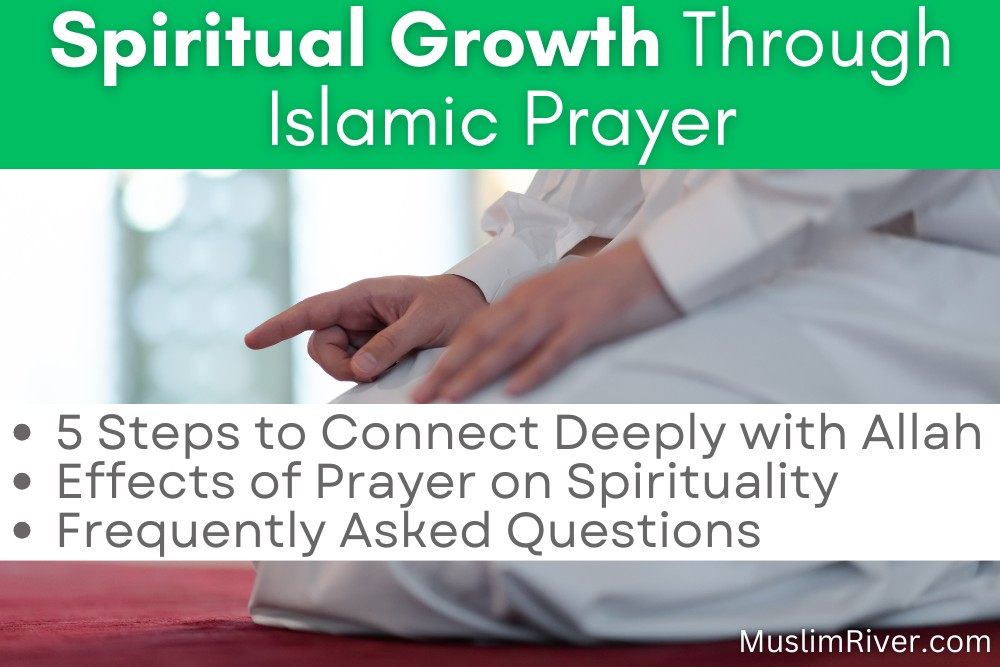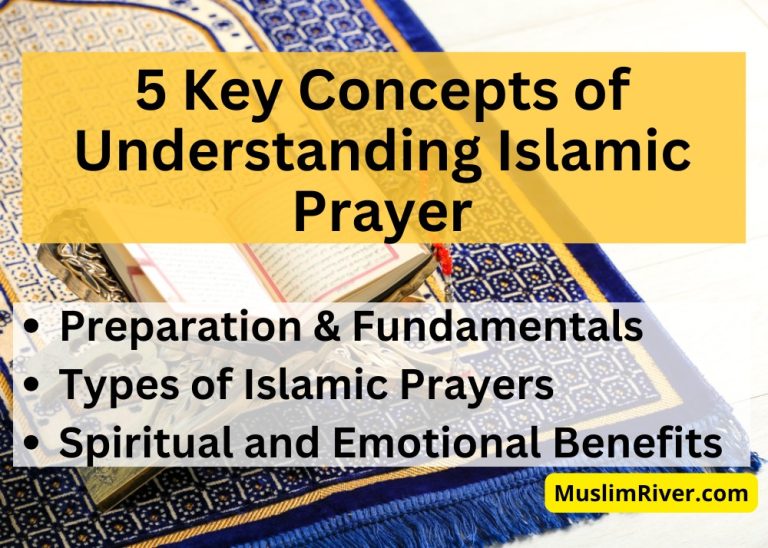5 Steps to Spiritual Growth Through Islamic Prayer
In today’s fast-paced world, many feel disconnected from a deeper sense of purpose and meaning. This topic addresses the challenges of isolation and the search for connection through spiritual practices.
I researched sacred texts & analyzed diverse spiritual practices to craft this post with a clear, relatable structure.
Key points discussed are the Salah, the 5 Steps to Spiritual Growth Through Islamic Prayer, and the Effects of Regular Prayer on Spirituality. Each part serves as a guide to inner growth.
You will gain insights into finding inner peace, enhanced spiritual well-being, and a renewed sense of belonging.
Stay tuned to uncover an exclusive 5 steps that reveal how these spiritual practices can unlock a transformative journey toward fulfillment.

What Prayer Represents in Islam
For me, prayer is more than just a routine—it’s a sacred conversation with my Creator.
As one of the Five Pillars of Islam, Salah symbolizes submission, gratitude, and the remembrance of Allah. Each prayer helps you reconnect with these core values.
Every time I bow in prayer, I experience a moment of renewal. It’s a time of solace and guidance that refreshes my spirit and deepens my faith.
5 Steps to Spiritual Growth Through Islamic Prayer
Ever feel that your prayer could be more than a routine? Are you seeking a deeper, more personal connection with Allah?
In this guide, I’ll cover key points including sincerity, focus, and reflection, all essential for achieving inner peace and a closer bond with Allah.
Following these steps will help you experience increased mindfulness, emotional balance, and transformative growth in your spiritual life.
1. Developing Sincerity (Ikhlas) in Prayer —
Now, let’s begin with the importance of establishing a pure, heartfelt conversation with Allah. By setting clear intentions, each prayer becomes a meaningful dialogue rather than a mere routine recitation.
💡 Tip: Start each prayer by reminding yourself of its personal significance.
With sincerity as the foundation, we now shift our focus to creating an environment that deepens your concentration during prayer.
Arabic: قَدْ أَفْلَحَ ٱلْمُؤْمِنُونَ ١ ٱلَّذِينَ هُمْ فِى صَلَاتِهِمْ خَـٰشِعُونَ ٢
Translation: Successful indeed are the believers: those who humble themselves in prayer;
Source: Surah Al-Mu’minun – 1 – Quran.comSurah Al-Mu’minun – 2 – Quran.com
2. Enhancing Focus and Presence (Khushu’) —
Next, focus on cultivating an atmosphere that promotes full concentration:
- Perform a mindful wudu as a cleansing ritual for both body and spirit.
- Choose a quiet, undisturbed space.
- Visualize standing before Allah as you recite your prayers.
For example, establishing a consistent routine can help shift your attention from everyday distractions to inner reflection.
Once focus is secured, it’s essential to understand the deeper meanings behind your words to further enrich the experience.
Arabic: قَدْ أَفْلَحَ الْمُؤْمِنُوْنَ ، الَّذِيْنَ هُمْ فِْى صَلَاتِهِمْ خَـٰشِعُوْنَ
Translation: Successful indeed are the believers, who are humble in their ṣalāh
Source: Surah Al-Mu’minun – 1 – Quran.com Surah Al-Mu’minun – 2 – Quran.com
3. Embracing the Meaning of the Prayers —
Understanding the significance behind each verse transforms your recitations into a soulful dialogue with the Divine.
For instance, delving into the meanings turns scripted words into personal insights.
With a deeper understanding in place, let’s now add a personal element to your practice.
4. Incorporating Dua for a Deeper Connection —
After Salah, take time for a personal dua. This moment allows you to express your thoughts and feelings directly to Allah, reinforcing your faith and nurturing your relationship with the Creator.
Allah says in the Quran in Surah Ghafir, verse 60:
Arabic: وَقَالَ رَبُّكُمُ ٱدْعُونِىٓ أَسْتَجِبْ لَكُمْ ۚ إِنَّ ٱلَّذِينَ يَسْتَكْبِرُونَ عَنْ عِبَادَتِى سَيَدْخُلُونَ جَهَنَّمَ دَاخِرِينَ ٦٠
Translation: Your Lord has proclaimed, “Call upon Me, I will respond to you. Surely those who are too proud to worship Me will enter Hell, fully humbled.”
Source: Surah Ghafir – 60 – Quran.com
Building on the personalized dialogue of dua, it’s equally vital to use prayer as a moment for introspection.
5. Using Prayer as a Moment of Reflection and Gratitude —
Lastly, pause during your prayer routine to reflect on your actions and express gratitude. This practice turns every moment of worship into an opportunity for self-improvement and continuous spiritual growth.
Building Consistency and Overcoming Laziness
- Set alarms or reminders for prayer times.
- Integrate your prayers into a consistent daily schedule.
- Share your journey with supportive friends or family to stay motivated.
By moving through these steps—starting with sincerity, enhancing focus, embracing meaning, incorporating dua, and reflecting with gratitude—you transform your prayer routine into a powerful tool for spiritual growth.
Enjoy a renewed connection with Allah and experience the profound, transformative benefits of a mindful, heartfelt practice.
The Effects of Regular Prayer on Spirituality
Ever wondered how regular prayer can transform your inner life? Do you feel overwhelmed by life’s challenges and yearn for a deeper connection with Allah?
In this section, I’ll walk you through three key points: strengthening your faith, developing inner virtues like patience and gratitude, and enhancing your emotional well-being.
Following these steps will help you achieve spiritual balance, inner peace, and a resilient mindset.
a) Strengthening Faith and Connection with God
Regular prayer deepens your connection with Allah.
Every time you perform Salah, you experience a gentle reminder of your purpose and dependence on a loving Creator.
During your prayer, you might feel a surge of trust and gratitude as you reflect on Allah’s wisdom and mercy.
💡 Tip: Consistency in prayer can gradually transform your relationship with Allah, reinforcing your faith with every recitation.
With a strengthened connection in place, let’s move on to how prayer cultivates essential personal virtues.
b) Developing Patience, Gratitude, and Self-Discipline
Prayer instills patience, gratitude, and self-discipline—qualities that help you navigate life’s challenges.
- PATIENCE: Endures daily obstacles with calm perseverance.
- GRATITUDE: Recognize and praise Allah’s blessings regularly.
- SELF-DISCIPLINE: Follow a structured schedule that reinforces commitment even in adversity.
By sticking to scheduled prayers, you learn to build a routine that mirrors the disciplined structure of a balanced life.
💡 Tip: After each prayer, take a moment to note one blessing in your life; this simple habit can boost your gratitude and patience.
Having nurtured these internal virtues, let’s explore how prayer serves as a sanctuary for your mind.
c) Increasing Emotional Well-Being and Mental Clarity
In the midst of daily chaos, regular prayer becomes a refuge that brings mental clarity and emotional balance.
The rhythmic recitations and movements during Salah can act as an emotional detox, clearing your mind of stress and fostering a sense of calm.
- Set a Consistent Prayer Schedule: Reinforces discipline and habit formation.
- Reflect on Each Session: Enhance gratitude and awareness with a post-prayer reflection.
- Embrace the Moment: Use each prayer as an opportunity to disconnect from external chaos and reconnect with your inner self.
Regular prayer not only strengthens your faith and connection with Allah but also builds essential virtues and mental clarity.
By integrating these practices into your daily life, you set the stage for a more resilient and spiritually enriched journey.
Start your transformative journey today and experience the profound effects of regular prayer on your overall well-being.
Frequently Asked Questions
How does Islamic prayer transform one’s spiritual journey?
It acts as a catalyst for deep, inner change, shifting my focus from everyday chaos to spiritual serenity.
Each session of Salah grounds my spirit and brings renewed clarity and purpose.
The ritual helps me navigate life’s ups and downs with a centered heart.
What specific aspects of Salah contribute to spiritual growth?
- Mindful Purification: The process of wudu cleanses not just the body but also refreshes the spirit.
- Rhythmic Recitations: The cadence of reciting verses creates a meditative state that enhances focus and mindfulness.
- Humility in Prostration: The act of prostrating instills a deep sense of humility and surrender to Allah.
How can I ensure that my prayer remains sincere and meaningful?
- INTENTION: I remind myself that each prayer is an intimate conversation with Allah, not just a ritual to complete.
- UNDERSTANDING: I take time to learn the meanings behind the recitations, which enriches the spiritual experience.
- REFLECTION: I regularly pause to assess my inner state, ensuring that my heart remains engaged and honest.
Conclusion: Prayer as a Lifelong Journey Towards Spiritual Enlightenment
I’ve come to realize that Salah isn’t just an obligation—it’s a profound path to spiritual enlightenment.
When I approach prayer with sincerity, focus, and a deep desire to understand its meaning, I discover that each session enriches my faith, nurtures my emotional well-being, and strengthens my self-discipline.
Embracing the Transformative Power of Prayer
- I see prayer as a journey that continuously deepens my connection with Allah, turning daily routines into moments of inner growth.
- With every act of worship, I invite peace and clarity into my life, allowing my heart and mind to be renewed.
A Lifelong Commitment to Inner Peace
Maintaining a committed prayer life fills me with purpose and fulfillment, regardless of where I am on my spiritual path.
I embrace the understanding that every prayer is a step forward in my lifelong pursuit of spiritual enlightenment, offering comfort and direction in every challenge.






